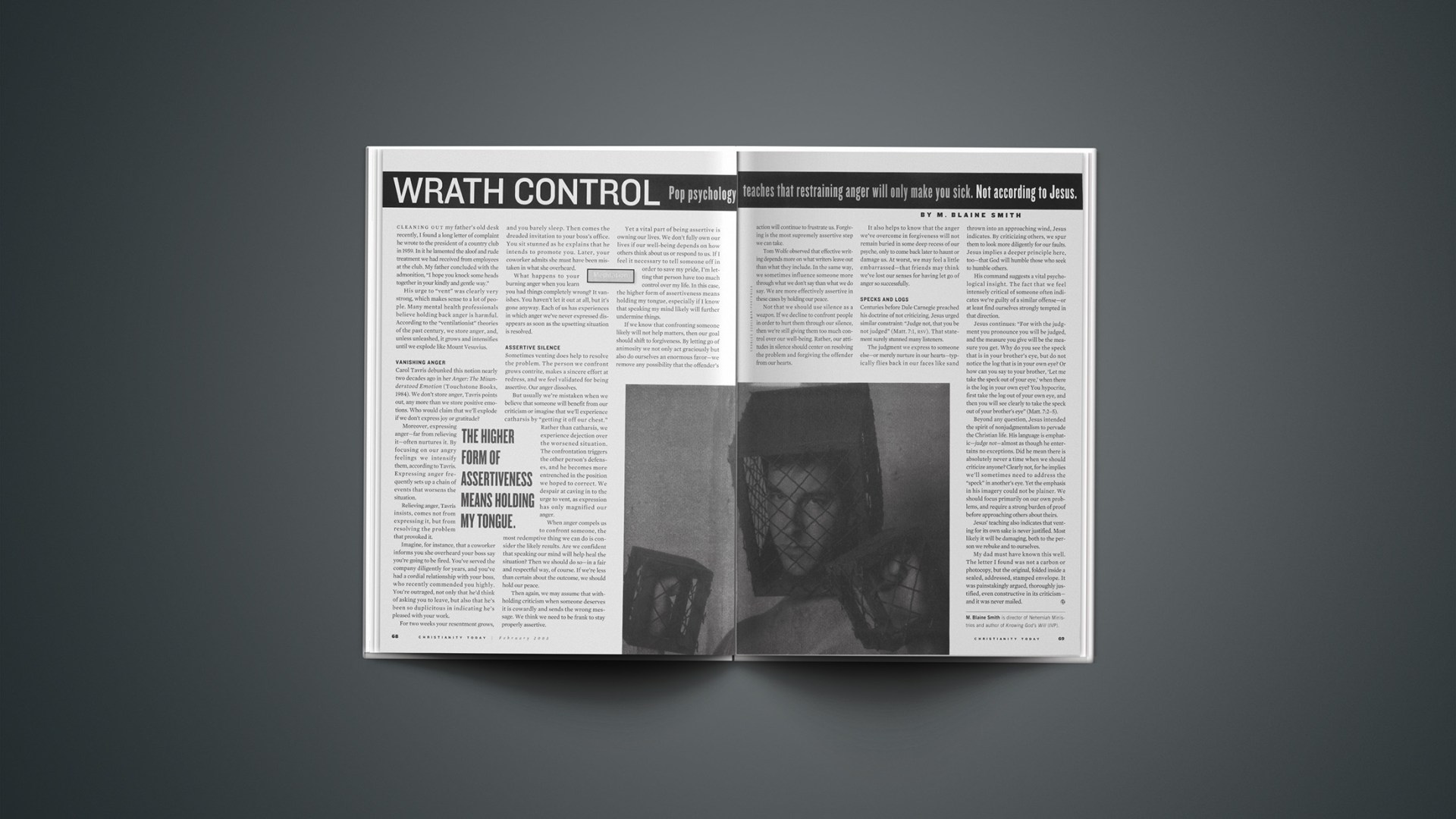Cleaning out my father’s old desk recently, I found a long letter of complaint he wrote to the president of a country club in 1959. In it he lamented the aloof and rude treatment we had received from employees at the club. My father concluded with the admonition, “I hope you knock some heads together in your kindly and gentle way.”
His urge to “vent” was clearly very strong, which makes sense to a lot of people. Many mental health professionals believe holding back anger is harmful. According to the “ventilationist” theories of the past century, we store anger, and, unless unleashed, it grows and intensifies until we explode like Mount Vesuvius.
Vanishing anger
Carol Tavris debunked this notion nearly two decades ago in her Anger: The Misunderstood Emotion (Touchstone Books, 1984). We don’t store anger, Tavris points out, any more than we store positive emotions. Who would claim that we’ll explode if we don’t express joy or gratitude?
Moreover, expressing anger—far from relieving it—often nurtures it. By focusing on our angry feelings we intensify them, according to Tavris. Expressing anger frequently sets up a chain of events that worsens the situation.
Relieving anger, Tavris insists, comes not from expressing it, but from resolving the problem that provoked it.
Imagine, for instance, that a coworker informs you she overheard your boss say you’re going to be fired. You’ve served the company diligently for years, and you’ve had a cordial relationship with your boss, who recently commended you highly. You’re outraged, not only that he’d think of asking you to leave, but also that he’s been so duplicitous in indicating he’s pleased with your work.
For two weeks your resentment grows, and you barely sleep. Then comes the dreaded invitation to your boss’s office. You sit stunned as he explains that he intends to promote you. Later, your coworker admits she must have been mistaken in what she overheard.
What happens to your burning anger when you learn you had things completely wrong? It vanishes. You haven’t let it out at all, but it’s gone anyway. Each of us has experiences in which anger we’ve never expressed disappears as soon as the upsetting situation is resolved.
Assertive silence
Sometimes venting does help to resolve the problem. The person we confront grows contrite, makes a sincere effort at redress, and we feel validated for being assertive. Our anger dissolves.
But usually we’re mistaken when we believe that someone will benefit from our criticism or imagine that we’ll experience catharsis by “getting it off our chest.” Rather than catharsis, we experience dejection over the worsened situation. The confrontation triggers the other person’s defenses, and he becomes more entrenched in the position we hoped to correct. We despair at caving in to the urge to vent, as expression has only magnified our anger.
When anger compels us to confront someone, the most redemptive thing we can do is consider the likely results. Are we confident that speaking our mind will help heal the situation? Then we should do so—in a fair and respectful way, of course. If we’re less than certain about the outcome, we should hold our peace.
Then again, we may assume that withholding criticism when someone deserves it is cowardly and sends the wrong message. We think we need to be frank to stay properly assertive.
Yet a vital part of being assertive is owning our lives. We don’t fully own our lives if our well-being depends on how others think about us or respond to us. If I feel it necessary to tell someone off in order to save my pride, I’m letting that person have too much control over my life. In this case, the higher form of assertiveness means holding my tongue, especially if I know that speaking my mind likely will further undermine things.
If we know that confronting someone likely will not help matters, then our goal should shift to forgiveness. By letting go of animosity we not only act graciously but also do ourselves an enormous favor—we remove any possibility that the offender’s action will continue to frustrate us. Forgiving is the most supremely assertive step we can take.
Tom Wolfe observed that effective writing depends more on what writers leave out than what they include. In the same way, we sometimes influence someone more through what we don’t say than what we do say. We are more effectively assertive in these cases by holding our peace.
Not that we should use silence as a weapon. If we decline to confront people in order to hurt them through our silence, then we’re still giving them too much control over our well-being. Rather, our attitudes in silence should center on resolving the problem and forgiving the offender from our hearts.
It also helps to know that the anger we’ve overcome in forgiveness will not remain buried in some deep recess of our psyche, only to come back later to haunt or damage us. At worst, we may feel a little embarrassed—that friends may think we’ve lost our senses for having let go of anger so successfully.
Specks and logs
Centuries before Dale Carnegie preached his doctrine of not criticizing, Jesus urged similar constraint: “Judge not, that you be not judged” (Matt. 7:1, rsv). That statement surely stunned many listeners.
The judgment we express to someone else—or merely nurture in our hearts—typically flies back in our faces like sand thrown into an approaching wind, Jesus indicates. By criticizing others, we spur them to look more diligently for our faults. Jesus implies a deeper principle here, too—that God will humble those who seek to humble others.
His command suggests a vital psychological insight. The fact that we feel intensely critical of someone often indicates we’re guilty of a similar offense—or at least find ourselves strongly tempted in that direction.
Jesus continues: “For with the judgment you pronounce you will be judged, and the measure you give will be the measure you get. Why do you see the speck that is in your brother’s eye, but do not notice the log that is in your own eye? Or how can you say to your brother, ‘Let me take the speck out of your eye,’ when there is the log in your own eye? You hypocrite, first take the log out of your own eye, and then you will see clearly to take the speck out of your brother’s eye” (Matt. 7:2-5).
Beyond any question, Jesus intended the spirit of nonjudgmentalism to pervade the Christian life. His language is emphatic—judge not—almost as though he entertains no exceptions. Did he mean there is absolutely never a time when we should criticize anyone? Clearly not, for he implies we’ll sometimes need to address the “speck” in another’s eye. Yet the emphasis in his imagery could not be plainer. We should focus primarily on our own problems, and require a strong burden of proof before approaching others about theirs.
Jesus’ teaching also indicates that venting for its own sake is never justified. Most likely it will be damaging, both to the person we rebuke and to ourselves.
My dad must have known this well. The letter I found was not a carbon or photocopy, but the original, folded inside a sealed, addressed, stamped envelope. It was painstakingly argued, thoroughly justified, even constructive in its criticism—and it was never mailed.
M. Blaine Smith is director of Nehemiah Ministries and author of Knowing God’s Will (IVP).
Copyright © 2003 Christianity Today. Click for reprint information.
Related Elsewhere
The website for Nehemiah Ministries includes more information on Nehemiah and Blaine Smith. Smith’s Knowing God’s Will is available at Christianbook.com.
Garret Keizer’s The Enigma of Anger: Essays on a Sometimes Deadly Sin was excerpted in Christianity Today sister publication Books & Culture last fall. CT also reviewed the book.
Other articles on handling anger in Christianity Today sister publications include:
Taking It Personally | What do we do with all this anger? (Christianity Today, Sept. 14, 2001)
Anger with No Sin | It’s not easy, but it’s possible. (Leadership, Dec. 1, 1999)










